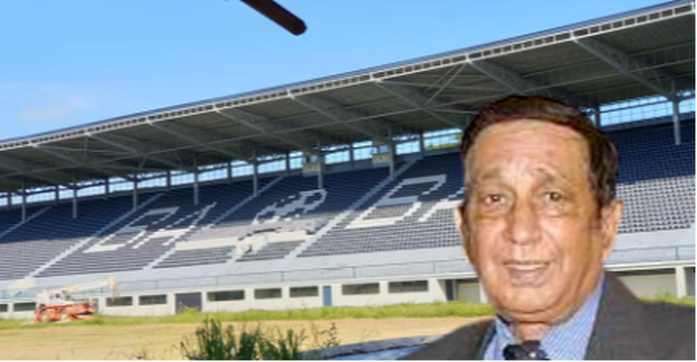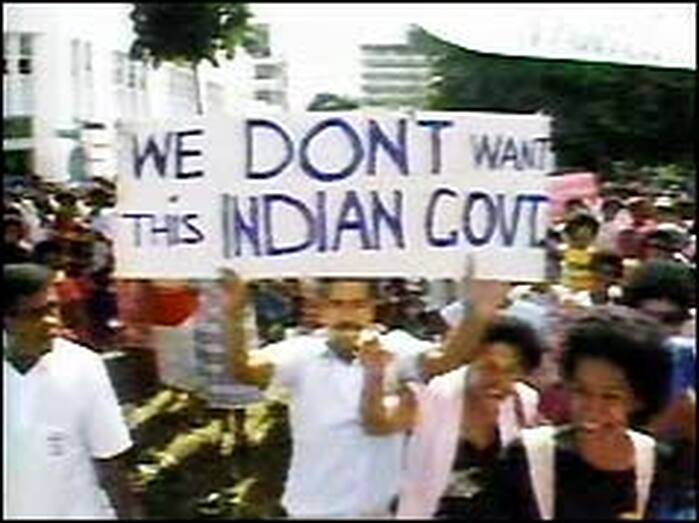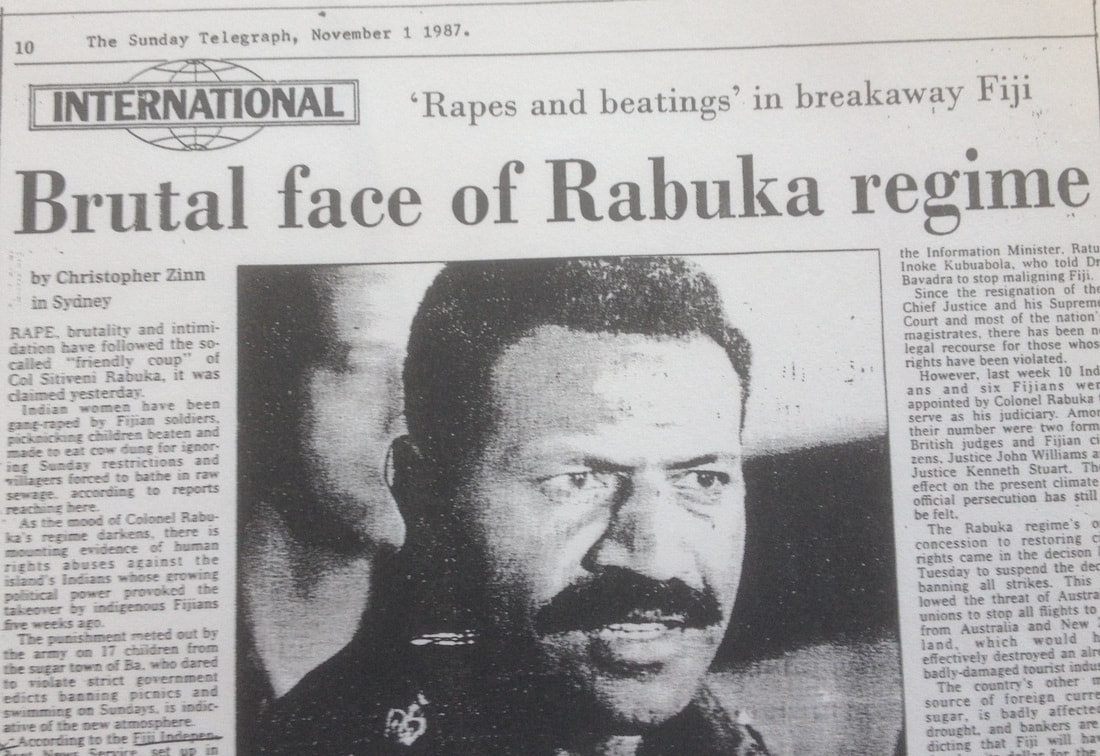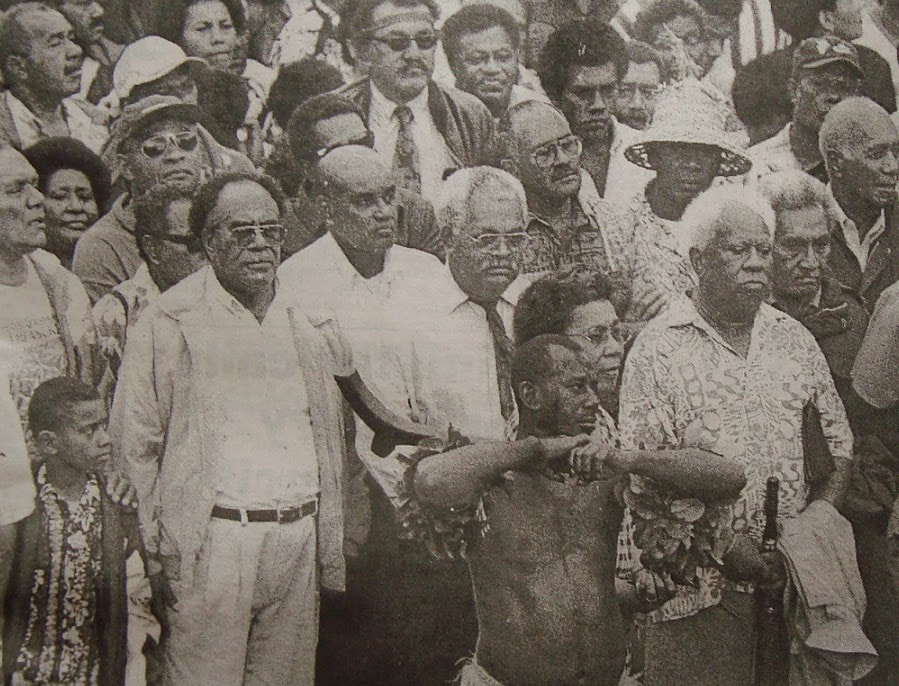JUSTICE KISHORE GOVIND passed away in Australia (9 August 2020) and his nemesis APISAI TORA passed away in Fiji (6 August 2020). We look back at the straigh-forward life of Justice Govind and will do a longer obituary on the violent and volatile Tora later on. While Govind found himself imprisoned by Rabuka, Tora went around rounding up Indo-Fijians, many who had spent their lives helping him. He was the most VIOLENT and FEARFUL FACE of Rabuka's FIJI FOR THE FIJIANS. He might have mellowed in old age but along with the RACIST Sitiveni Rabuka, the snake Ratu Inoke Kubuabola, and the gullible Ratu Meli Vesikula, they drove thousands upon thousands of Indo-Fijians out of Fiji after their planned coup on 14 May 1987 - to coincide with the anniversary arrival of the first Indian indentured labourers - 14 May 1879
"In September [1987], the army took full control. His Lordship [Justice Govind] was arrested at his home and taken to the prison in Suva where he was held for three nights in the maximum-security wing. Whilst being held in prison, death threats were made against his family. Meanwhile, all the judges of the Supreme Court resigned, rather than serve under the new regime. It became too dangerous for Kishor and his family to remain in Fiji and the hard decision to leave was made.". He left for Australia before the racist coupist Rabuka could expel him out of his native Fiji.
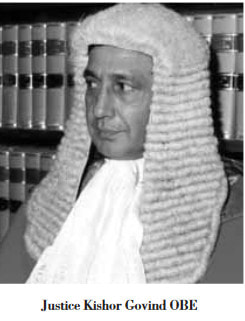
Justice Kishor[e] Govind, OBE
By Luigi Lamprati (2002)
BAR NEWS, The Journal of the NSW Bar Association, Summer 2002/2003
Human rights lawyers and New South Wales Barristers, particularly those practising in criminal law, have been gratified at the recent appointment of Kishor Govind OBE to the High Court of Fiji. His Lordship took up his appointment on 31 July of this year.
The appointment was in effect a resumption of his Lordship’s previous tenure, which ceased in the aftermath of the 1987 coup. His Lordship’s career to date has been one marked by distinguished and courageous service to the law and the cause of human rights, combined with an extraordinarily diverse contribution to public and community affairs in his native Fiji.
After graduating in law from Victoria University(Wellington) in New Zealand, Kishor was admitted in 1961 as a barrister and solicitor in New Zealand and Fiji. He established his own firm which, in time, became one of the largest law firms in Fiji. Kishor specialised as a barrister, practising mainly in criminal law and family law. He appeared as counsel in several high profile murder trials. He also assisted many who were unable to afford legal expense by performing much pro bono work.
He played a central role in the drafting of the Agricultural, Landlord and Tenant Actwhich figured importantly in the life of Fiji as the legal basis of land tenure for non-ethnic Fijians. Between 1977 and 1981 he was president of the Law Society of Fiji. Apart from his legal practice, Kishorinvolved himself in a variety of other areas.In the field of public affairs, he was mayor of his home town of Ba for 12 years and a member of the Fiji Parliament for five years. He was president of the Fiji Local Government Association for four years and, in 1980, was awarded an OBE for services to local government.
A keen sport lover, he was, in turn, president of the Ba Soccer Association and manager of Fiji Soccer. He became vice-president of the Fiji Sports Council.He has been and remains very active in the field of human rights. He is a member of the Lawasia Human Rights Committee, having formerly been vice-president ofLawAsia and chairman of its Human RightsCommittee. Kishor has presented numerous papers on human rights and legal aid at various law conferences.It came as no surprise when Kishor, with such a distinguished record of service to the law and human rights and the wider community, was appointed as a judge of the Supreme Court of Fiji in1985.
His Lordship served as a judge until 1987, when Colonel Sitiveni Rabuka staged a coup.The judges declared that the coup notwithstanding, they intended to function according to their oaths of office. The relationship between the government and the judiciary deteriorated rapidly. The army arrogated to itself control and purported to abolish the 1970 Constitution. In August of that year, in opening the Supreme Court criminal sessions, his Lordship spoke out strongly against the position of the army which saw itself as supreme arbiter of the law and the rights of citizens. In forthright terms, he declared that the judiciary could not supinely acquiesce in what was happening, pointing out that no one was above the rule of law. He condemned the practice of arbitrary detention, declaring it to be ‘odious’, anathema to democracy and contrary to the Constitution. He reminded lawyers, and members of the Bar in particular, of their duty to stand fast and speak out against the evil of arbitrary detention.
These public comments of his lordship, which became front-page news in Fiji, scarcely endeared him to the military. Within a short period, he himself was detained. In September, the army took full control. His Lordship was arrested at his home and taken to the prison in Suva where he was held for three nights in the maximum-security wing. Whilst being held in prison, death threats were made against his family. Meanwhile, all the judges of the Supreme Court resigned, rather than serve under the new regime. It became too dangerous for Kishor and his family to remain in Fiji and the hard decision to leave was made.
He came to Australia.Kishor was admitted to the New SouthWales Bar in 1987. He worked for a time in the Office of the Commonwealth Director of Public Prosecutions and then moved to the NSW Office of the Director of PublicProsecutions. In 1989 he was appointed as a crown prosecutor. He prosecuted at many trials, mainly in the western districts of Sydney and was well respected as aknowledgeable and competent counsel in the field of criminal law. His engaging personality and dry sense of humour made him a popular figure. In Sydney, he was able to indulge his love of sport, especially cricket.
Colleagues also noticed the development of an enviable talent for the selection of winners in the sport of kings!His interest in human rights continued, and from time to time he gave addresses on the subject. He is a gifted after dinner speaker.In 2001, Kishor resigned as a crown prosecutor. He later worked in New Zealand assisting in the repatriation of Fijian Indians. He was then invited to return to Fiji, where constitutional order is now very much improved, and to take up again his position as a judge of the(now renamed) High Court. Poetic (and real) justice! His return to judicial life in Fiji was greeted with enthusiasm by his numerous friends and former colleagues.
At his swearing-in, the spokesman for the Bar bluntly told his Lordship: ‘The country needs more judges such as you’. It was a particular source of pleasure to his lordship that many of those attending had been without access to convenient transport but, nevertheless, were determined to be present and had gone to great lengths to be there.
His Lordship assumed his position in Fiji with the best wishes of both branches of the profession in New South Wales and his many friends in Sydney. With family members now settled here, it is expected that his Lordship will visit regularly.
By Luigi Lamprati (2002)
BAR NEWS, The Journal of the NSW Bar Association, Summer 2002/2003
Human rights lawyers and New South Wales Barristers, particularly those practising in criminal law, have been gratified at the recent appointment of Kishor Govind OBE to the High Court of Fiji. His Lordship took up his appointment on 31 July of this year.
The appointment was in effect a resumption of his Lordship’s previous tenure, which ceased in the aftermath of the 1987 coup. His Lordship’s career to date has been one marked by distinguished and courageous service to the law and the cause of human rights, combined with an extraordinarily diverse contribution to public and community affairs in his native Fiji.
After graduating in law from Victoria University(Wellington) in New Zealand, Kishor was admitted in 1961 as a barrister and solicitor in New Zealand and Fiji. He established his own firm which, in time, became one of the largest law firms in Fiji. Kishor specialised as a barrister, practising mainly in criminal law and family law. He appeared as counsel in several high profile murder trials. He also assisted many who were unable to afford legal expense by performing much pro bono work.
He played a central role in the drafting of the Agricultural, Landlord and Tenant Actwhich figured importantly in the life of Fiji as the legal basis of land tenure for non-ethnic Fijians. Between 1977 and 1981 he was president of the Law Society of Fiji. Apart from his legal practice, Kishorinvolved himself in a variety of other areas.In the field of public affairs, he was mayor of his home town of Ba for 12 years and a member of the Fiji Parliament for five years. He was president of the Fiji Local Government Association for four years and, in 1980, was awarded an OBE for services to local government.
A keen sport lover, he was, in turn, president of the Ba Soccer Association and manager of Fiji Soccer. He became vice-president of the Fiji Sports Council.He has been and remains very active in the field of human rights. He is a member of the Lawasia Human Rights Committee, having formerly been vice-president ofLawAsia and chairman of its Human RightsCommittee. Kishor has presented numerous papers on human rights and legal aid at various law conferences.It came as no surprise when Kishor, with such a distinguished record of service to the law and human rights and the wider community, was appointed as a judge of the Supreme Court of Fiji in1985.
His Lordship served as a judge until 1987, when Colonel Sitiveni Rabuka staged a coup.The judges declared that the coup notwithstanding, they intended to function according to their oaths of office. The relationship between the government and the judiciary deteriorated rapidly. The army arrogated to itself control and purported to abolish the 1970 Constitution. In August of that year, in opening the Supreme Court criminal sessions, his Lordship spoke out strongly against the position of the army which saw itself as supreme arbiter of the law and the rights of citizens. In forthright terms, he declared that the judiciary could not supinely acquiesce in what was happening, pointing out that no one was above the rule of law. He condemned the practice of arbitrary detention, declaring it to be ‘odious’, anathema to democracy and contrary to the Constitution. He reminded lawyers, and members of the Bar in particular, of their duty to stand fast and speak out against the evil of arbitrary detention.
These public comments of his lordship, which became front-page news in Fiji, scarcely endeared him to the military. Within a short period, he himself was detained. In September, the army took full control. His Lordship was arrested at his home and taken to the prison in Suva where he was held for three nights in the maximum-security wing. Whilst being held in prison, death threats were made against his family. Meanwhile, all the judges of the Supreme Court resigned, rather than serve under the new regime. It became too dangerous for Kishor and his family to remain in Fiji and the hard decision to leave was made.
He came to Australia.Kishor was admitted to the New SouthWales Bar in 1987. He worked for a time in the Office of the Commonwealth Director of Public Prosecutions and then moved to the NSW Office of the Director of PublicProsecutions. In 1989 he was appointed as a crown prosecutor. He prosecuted at many trials, mainly in the western districts of Sydney and was well respected as aknowledgeable and competent counsel in the field of criminal law. His engaging personality and dry sense of humour made him a popular figure. In Sydney, he was able to indulge his love of sport, especially cricket.
Colleagues also noticed the development of an enviable talent for the selection of winners in the sport of kings!His interest in human rights continued, and from time to time he gave addresses on the subject. He is a gifted after dinner speaker.In 2001, Kishor resigned as a crown prosecutor. He later worked in New Zealand assisting in the repatriation of Fijian Indians. He was then invited to return to Fiji, where constitutional order is now very much improved, and to take up again his position as a judge of the(now renamed) High Court. Poetic (and real) justice! His return to judicial life in Fiji was greeted with enthusiasm by his numerous friends and former colleagues.
At his swearing-in, the spokesman for the Bar bluntly told his Lordship: ‘The country needs more judges such as you’. It was a particular source of pleasure to his lordship that many of those attending had been without access to convenient transport but, nevertheless, were determined to be present and had gone to great lengths to be there.
His Lordship assumed his position in Fiji with the best wishes of both branches of the profession in New South Wales and his many friends in Sydney. With family members now settled here, it is expected that his Lordship will visit regularly.

